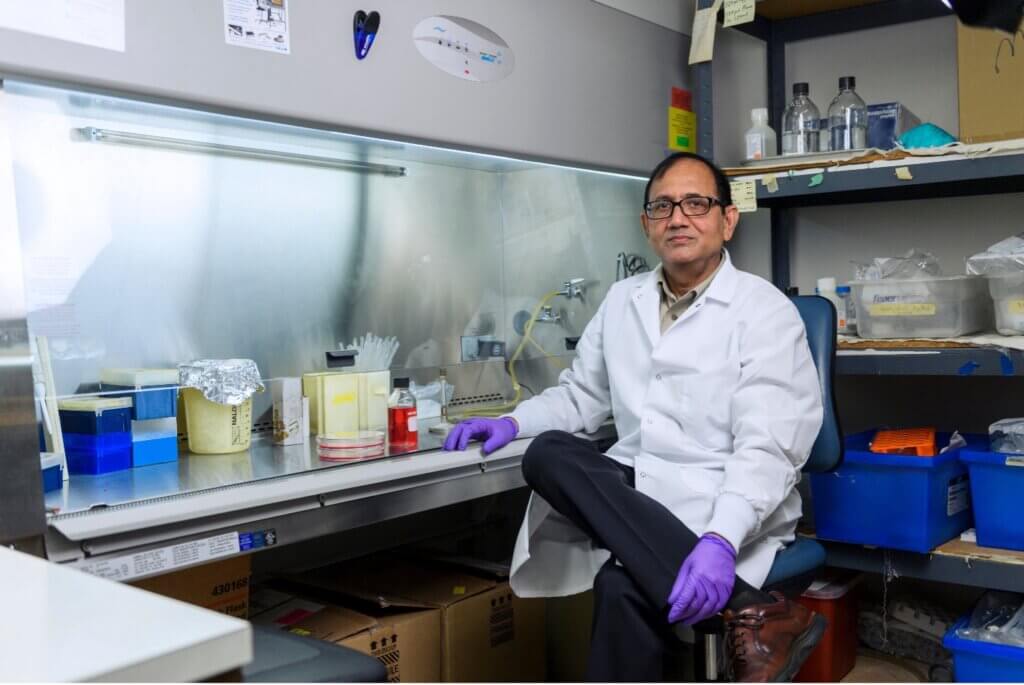Promising initial research could lead to more effective seasonal flu shots and ward against future pandemics

Dry cough. Runny nose. Sore throat. Muscle aches. These symptoms are all familiar to anyone who’s contracted the common flu, a respiratory illness that affects one billion people each year. The Centers for Disease Control and Prevention recommend most people receive yearly flu shots because the seasonal influenza virus mutates constantly, creating new strains that circulate from person-to-person leading to seasonal flu epidemics. These yearly vaccines are formulated to protect against the specific virus strains expected to spread and cause illness during that flu season, typically October through May.
A flu pandemic, such as the 1918 pandemic that infected around one-third of the world’s population and caused an estimated 50 million deaths, occurs when a global outbreak of a new strain of influenza A virus emerges that is radically different from the currently circulating strains. Because seasonal flu shots are specifically formatted to combat certain strains of influenza — including the virus type that causes the flu in birds and some mammals, including humans — current vaccine formulations offer no protection against a novel strain. At present, it takes about six months to formulate and produce large quantities of flu vaccine, during which time widespread infection can cause severe illness and even death.
Led by Dr. Suresh Mittal, Distinguished Professor of Virology in the Purdue University College of Veterinary Medicine, researchers are working on the development of a universal vaccine, one that would offer protection against all forms of influenza A that infect humans, regardless of the strain. Such a vaccine could eliminate the need to reformulate seasonal flu vaccines and provide the health care system with a jumpstart in combatting the next flu pandemic.
“Every year, the flu vaccine gets updated because its components are strain specific,” Dr. Mittal said. “A universal vaccine would strengthen the efficacy of seasonal flu vaccines. In the case of an influenza pandemic, the universal vaccine could be used to help control a global outbreak until a variant-specific vaccine is developed.”
The current seasonal influenza vaccines predominately stimulate the production of influenza-specific antibodies, the proteins produced by an immune system to protect the body from infectious agents, such as viral infections. Antibodies attach to the outside of viruses, facilitating their neutralization and removing them from the body. The influenza virus’s major surface protein, called hemagglutinin — from the Greek word for blood and the Latin word for glue — binds to the mucosal lining of the upper respiratory tract and initiates viral infection. Hemagglutinins also mutate frequently, creating new strains of influenza virus.
Dr. Mittal’s research team is investigating a novel approach to fight influenza. Rather than boosting the antibody specific to the virus surface proteins, the team’s work targets an internal nucleoprotein that is conserved in multiple strains of influenza A viruses. Because the nucleoprotein doesn’t mutate the way hemagglutinins do, attacking it stands a better chance of fighting off the flu, regardless of the strain. The method relies on generating a T cell response, rather than an antibody response.
“Our cells go through a natural cellular recycling process called autophagy that removes unnecessary or dysfunctional components,” Dr. Mittal said. “By attaching an autophagy-inducing peptide to the nucleoprotein, it forces the antigen to go through autophagy. This triggered an enhanced T cell response which was shown to be effective in inducing protection against several influenza viruses having different hemagglutinin subtypes.”
The study, published in the February 2024 journal Vaccines, tested the immunization response against the five subtypes of influenza A viruses known to cause human infections (H1, H3, H5, H7, and H9). In laboratory testing, nucleoprotein-targeted vaccines administered through the nose provided immunity against all five strains.
“We were initially surprised by the results,” Dr. Mittal said. “To ensure we had not made any mistakes during immunization, we ran the experiment a second time. The results were the same. This study indicates that development of a universal influenza vaccine could be possible. It also suggests intranasal delivery of the vaccine, rather than intramuscular injections, may be a better method of administration for vaccines designed to protect against contagious respiratory illnesses.”
Dr. Mittal served as principal investigator for the study. A co-author, Dr. Suryaprakash Sambhara, Immunology Team lead in the Immunology and Pathogenesis Branch of the Influenza Division at the Centers for Disease Control and Prevention, is also Dr. Mittal’s longtime research collaborator. Dr. Ekramy Sayedahmed, a research scientist on Dr. Mittal’s research team, led the laboratory testing. The research was funded by the National Institute of Allergy and Infectious Diseases within the National Institutes of Health.
In the next phase of testing, the researchers plan to conduct a durability study to determine the length of time immunization with the universal flu vaccine is effective. Current seasonal flu vaccines provide immunity for about six months. If that study proves successful, the hope is to move to human clinical trials.
“As a veterinarian, I believe in the concept of one health,” Dr. Mittal said. “Human health is closely linked to the health of domestic and wild animals and the wider environment. Migratory birds are the main culprit for the spread of influenza viruses to humans, poultry, pigs and other animals. Everything is interdependent.”
After more than two decades of research in the field of virology, Dr. Mittal remains optimistic that a universal flu vaccine will one day be available to the public. And the technology and methodology introduced through this groundbreaking study will have a significant impact on the improvement of global health.
“Our team has been working toward a universal influenza vaccine for 20 years,” Dr. Mittal said. “As scientists, we can’t work for those breakthrough moments of discovery because they may not happen. When they do happen, it’s very satisfying to know we were heading in the right direction.”
